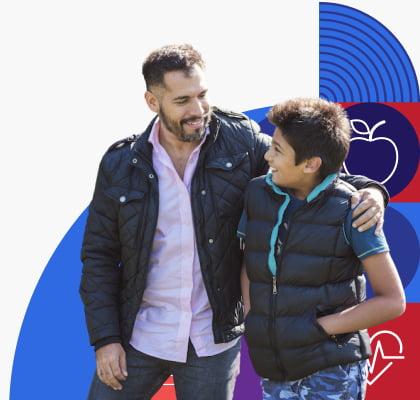Healthy Living
Talk to Your Kids About Sex and Healthy Relationships

The Basics
Overview
Talking honestly and openly with your kids about sex and relationships is important — and it's never too early to start. Your support can help them make healthy choices and avoid risks as they grow up.
It may be hard to know where to start, especially if your parents didn’t talk to you about relationships and sex when you were growing up. The following tips and strategies can help.
What do I say?
Kids have different questions and concerns about sex at different ages. As your children get older, the things you talk about will change. Remember to:
- Talk early and often — you don’t have to fit everything into 1 conversation!
- Be ready to answer questions — children’s questions can tell you a lot about what they already know
- Listen carefully to your kids' opinions, even if you don’t agree
- Try using things that come up on TV, in music, or on social media to start a conversation
- Be honest about how you're feeling — for example, if you're embarrassed or uncomfortable, it’s okay to say so
Will talking to my kids really make a difference?
Parents are the most important influence on a young person's decisions about relationships and sex — even more important than friends, siblings, or the media. Most young people say that it would be easier to make decisions about sex if they could talk openly and honestly with their parents.
Young people who talk with their parents about sex are more likely to put off having sex until they're older. They're also more likely to make healthy choices, like using condoms to prevent STIs (sexually transmitted infections) and pregnancy, if they do choose to have sex. STIs are also called STDs (sexually transmitted diseases).
Bodies and Puberty
When is the right time to start talking?
It’s never too early to start talking to children about their bodies. Be sure to use the medical names for all body parts and explain what they do. These resources can help:
- Reproductive systems with a vagina, uterus, and ovaries
(often called female reproductive systems)
- Reproductive systems with a penis and testicles
(often called male reproductive systems)
What do I tell my kids about puberty?
Puberty is when your child's body starts to develop and change into an adult body. Puberty is different for each child.
- For girls, puberty usually starts between ages 8 and 15 years. Get more information about what puberty is like for girls
.
- For boys, it usually begins between ages 9 and 16 years. Get more information about what puberty is like for boys
.
Puberty can be a confusing and overwhelming time for many young people. You can help your kids by:
- Telling them that puberty is a normal part of growing up
- Sharing facts to help them understand their changing bodies and feelings
- Talking about your own puberty experiences when you were growing up
As your kids get older, they may be less likely to ask you questions. So it’s a good idea for you to start conversations with them.
Healthy, Respectful Relationships
How can I help my kids build healthy, respectful relationships?
Start conversations about what healthy and respectful relationships look like. Talk with your child about what they should expect for themselves and others in their relationships with friends, as well as in romantic or sexual relationships.
Talk about the importance of respect in all relationships, including giving and receiving consent in dating or sexual relationships. And try to model healthy and respectful relationships for your child as much as possible.
Families have different expectations about when and how kids can start dating or having sexual relationships. Talk about your family expectations for healthy, respectful relationships before your child starts dating — and keep checking in with them often.
Learn more about healthy relationships. You can also share this resource about healthy relationships with your kids
.
Talk about different kinds of relationships, including relationships with opposite-sex and same-sex partners.
When you talk about relationships and sex, don't assume your child is only interested in opposite-sex relationships. Some young people may be interested in same-sex relationships or identify as lesbian, gay, or bisexual. And some may not be interested in sexual relationships at all — they may identify as asexual, for example.
It's important to let your child know that you love them and that you appreciate them sharing this part of their life with you. Young people who identify as lesbian, gay, and bisexual are less likely to be depressed if their parents are supportive. They’re also more likely to make healthy choices about sex and relationships. Find out how you can support a lesbian, gay, or bisexual child.
Pregnancy and STIs
What do I tell my child about preventing pregnancy and STIs?
Make sure your kids have the facts they need to make healthy and informed decisions about their sexual health. This includes information about pregnancy and STIs like HIV and chlamydia.
Even if you don't think your child is having sex or in a dating or romantic relationship, talk with them about ways to prevent pregnancy and STIs.
Tell your child about different kinds of birth control. It's also important to make sure your child knows how to access and use condoms to prevent STIs — even if they're also using another method to prevent pregnancy.
Check out these resources to learn more:
- Talk with Your Teen About Preventing STIs
- Choose the Right Birth Control
- Answering Questions About Sex
- Birth Control: What Parents Need to Know
Ask your kids where they get information about relationships, sex, pregnancy, and STIs.
Make sure you know where your child is getting health information. Some sources of information may be more medically accurate than others.
Encourage your child to talk with their doctor about sexual health.
Doctors can be a trustworthy source of information about relationships, sex, pregnancy, and STIs. Next time you bring your child for a doctor visit, ask if they’d like to spend a few minutes alone with the doctor to ask questions.
Learn why one-on-one time with their doctor is important for teens.
Content last updated April 8, 2025


